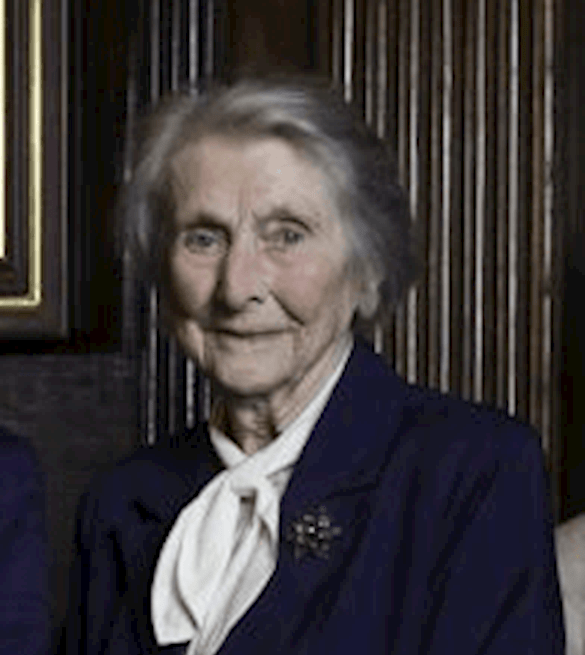WHEN Margaret Turner-Warwick graduated in 1950, the NHS was barely two years old. Medical practice was changing fast, and her own chosen field of respiratory medicine was no exception. The first effective treatments for tuberculosis were being introduced and the link between smoking and lung disease was being discussed for the first time. It was to this rapidly evolving specialty that she would devote the rest of her life.
Born Margaret Harvey Moore in London, she was schooled in Exeter and London and decided early on that she wanted to pursue a medical career. She studied at Lady Margaret Hall, an Oxford college which would later make her an honorary fellow.
Her lifelong approach to the practice of medicine was undoubtedly informed by her own experiences as a student and as a patient. At Oxford in 1946, she was diagnosed with pulmonary TB. In an era before the use of effective antibiotic treatment, she spent the following year recovering in a Swiss sanatorium. Her interactions there gave her an invaluable perspective on the patient experience. She met her husband Richard Turner-Warwick in 1944 when they were both medical students, and they married as soon as they qualified in 1950. He would go on to become an eminent urologist, while she would forge her own career in thoracic medicine. They supported each other in long and distinguished careers, and appropriately both were honoured for their work in the same year. In 1991, he received a CBE while his wife was made a dame.
She completed her clinical training and undertook junior posts at the University College and Brompton Hospitals in London. In 1961, she was first appointed as a consultant physician at the Elizabeth Garrett Anderson Hospital. Six years later she became a part-time consultant at the Brompton and London Chest Hospitals, and she secured a senior lectureship at the Institute of Diseases of the Chest. It would only be another five years before she became one of only two female professors of medicine in London. In 1972, she was appointed to the chair of thoracic medicine at what was now the Cardiothoracic Institute of the University of London.
In the end, the future of medicine will depend on those who really care for patients.
Dr Margaret Turner-Warwick
She acknowledged that her specialty of thoracic medicine was regarded as a ‘Cinderella subject’, but she worked tirelessly both personally and through her support and promotion of others to give it the firm academic foundation that it needed. Throughout her career she combined her clinical work, her academic research and her administrative and political tasks with great effectiveness. She was regarded universally as an exemplary clinician, while her research especially into pulmonary fibrosis and asthma was very highly regarded. Her political acumen was put to the test when in 1989 she was elected as the first female president of the Royal College of Physicians (RCP).
During her presidency, she faced many challenges. Not least of these were the major changes to the NHS imposed by the Thatcher government’s introduction of the internal market. At the time, many of the RCP’s counter proposals were ignored. However, Turner-Warwick remained constructive and used the situation as an opportunity to forge new working relationships with the other royal colleges — an initiative that led to the creation of the Academy of Medical Royal Colleges.
Throughout this time, she held fast to her belief that “while the NHS needs to be run in a more business-like way, it cannot be run simply as a business.” Later, when she wrote her memoirs, she revisited this and said: “If doctors allow their commitment to patients to be pushed into second place by political or managerial diktats, or more personal factors, then medicine will be at risk of losing its soul. In the end, the future of medicine will depend on those who really care for patients.”
It is perhaps too easy to focus on Turner-Warwick’s role as the first female president of the RCP in its 500-year history. While this is remarkable, she would have been disappointed to be defined by such an achievement alone. While openly acknowledging the challenges faced by women in medicine, she hated the idea of any kind of special pleading based on gender. She herself said: “I had no wish to be any kind of feminist pioneer or curiosity. That would have got in the way, gender has no place in medicine.”
Her relationships with people — her family, friends, colleagues and of course her patients — were what truly defined Turner-Warwick’s life. And the esteem of those who knew her is perhaps best summed up in the words of one of her daughters, Prof Lynne Turner-Stokes, who said: “Right up to the end she remained the go-to person for wisdom, advice and support, with that familiar signature question on answering the phone: ‘Hello. What can I do for you?’”
Sources
- www.rcplondon.ac.uk/news/dame-margaret-turner-warwick-dbe-dm-frcp (Accessed 22 May 2023)
- Dacre, J. Eulogy for Margaret Turner-Warwick, RCP, 2017.
- Turner-Warwick, M. Living Medicine: Recollections and Reflections. RCP, 2005.
- Taylor, AN. Obituary, the Guardian, 18 Sept 2017.
This page was correct at the time of publication. Any guidance is intended as general guidance for members only. If you are a member and need specific advice relating to your own circumstances, please contact one of our advisers.
Read more from this issue of Insight Primary

Save this article
Save this article to a list of favourite articles which members can access in their account.
Save to library

